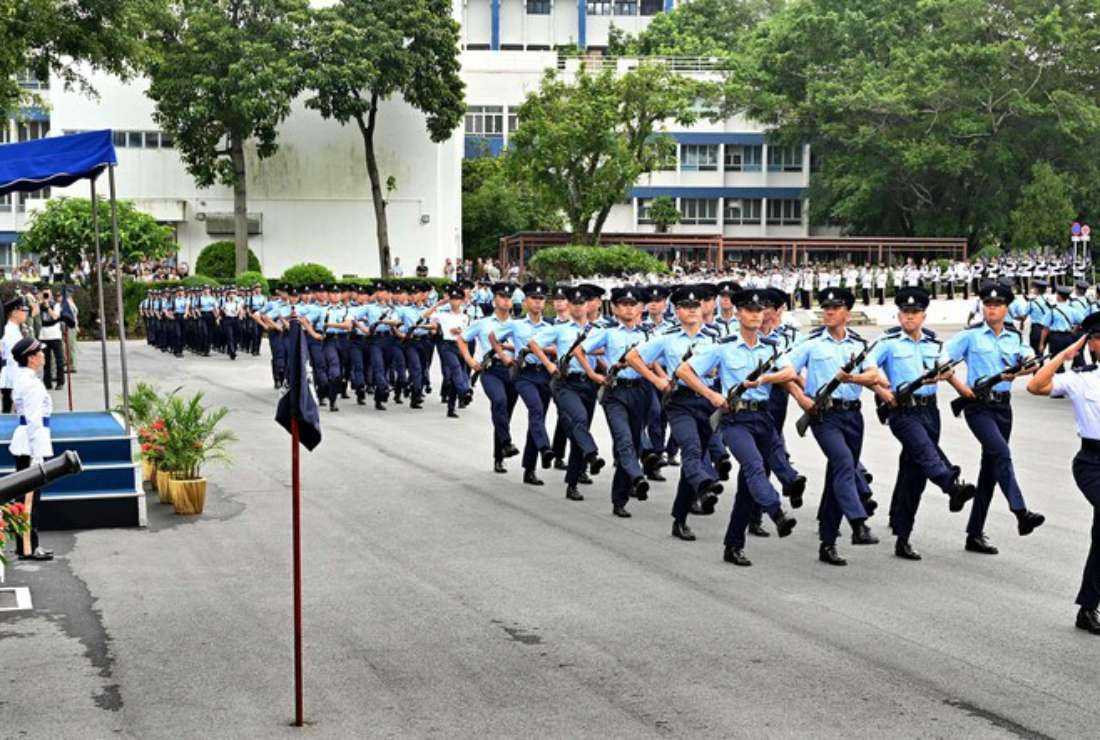
Zheng Yanxiong, Director of the Liaison Office of China’s Central Government in Hong Kong reviews the marching ranks of fresh graduates at the graduation ceremony at Hong Kong Police College on Sept. 16. (Photo: Hong Kong Government News Network via RFA)
The presence of a Chinese envoy in a police graduation ceremony in Hong Kong for the first time and special instructions highlight Beijing’s increasing influence on security affairs in the city, activists say.
Zheng Yanxiong, head of the Hong Kong Liaison Office of the Chinese Communist Party, attended the graduation ceremony of new police officers on Sept. 16, Radio Free Asia (RFA) reported on Sept. 18.
During the ceremony, Zheng warned the police officers of “hostile foreign forces,” attempting to return to the city, the report stated.
"Hong Kong is entering a new stage, moving from chaos to order and prosperity,” Zheng said in his keynote address.
“Yet there are still hostile foreign forces trying to undermine Hong Kong's development and stability, and there are also anti-China and Hong Kong elements trying to make a comeback,” Zheng said.
Zheng had also urged the graduates to be determined and “always resolutely safeguard national security” while “strictly implementing” the Hong Kong National Security Law and local laws.
Zheng’s unprecedented appearance at the review event was an affirmation of China’s jurisdiction over the city, says Chen Daoyin, an independent political scholar.
“In China, only [President] Xi Jinping has the power to review military parades – nobody else is,” Chen pointed out.
“Judging [based on] the relationship between the central government [in Beijing] and Hong Kong, the director of the Central Liaison Office is essentially the supreme leader [in Hong Kong],” he added.
A former policeman, Zheng received applause from the CCP leadership in 2011 after the heavy crackdown on rebels in Wukan village of Guangdong province amid a bitter land dispute in 2011.
“Zheng Yanxiong is a policeman himself, and his review of the police force sends a message to the rest of the world about who is the highest-ranking leader in Hong Kong,” Chen said.
“[It tells us that] he is the disciplinary power supervising Hong Kong on behalf of the central government,” Chen added.
Hong Kong’s pro-Beijing administration and the CCP have repeatedly blamed “hostile foreign forces” for inciting political unrest in the city.
In August, Hong Kong’s security chief Chris Tang blamed the mass protest campaign in 2012 by students including those from secondary schools against patriotic education in schools among other issues as the actions of "foreign forces."
He also alleged that “foreign forces” were behind the 2014 Occupy Central movement for fully democratic elections, the 2016 "fishball revolution" in Mong Kok, and the 2019 pro-democracy movement.
Tang, who was chief of police during the 2019 protests had said that "many young people had been radicalized” and “external forces were up to the same old tricks again,” RFA reported.
Zheng’s presence and words were beyond a normal ceremony, says current affairs commentator, Sang Pu.
"This was not just a ceremonial review. When he talked about ‘foreign forces’ and rebellious ‘anti-China’ elements, he was giving instructions,” Sang said.
“We see that it’s the party that is wielding the gun, or the sword, here,” Sang added.
“The Communist Party, or the Liaison Office, is ruling Hong Kong more directly, and will be putting direct pressure on police officers to obey the orders of the Central Committee, through propaganda,” he further added.
Ted Hui, an exiled former pro-democracy lawmaker alleged that the Hong Kong police have become a “political tool in the hands of Beijing."
"The political messaging here is very strong. It officially sets a precedent for the Hong Kong police to do political work,” Hui said.
“It is a direct recognition of the police force … as a weapon to suppress dissidents, and it describes the targeting of political prisoners as an important national political task,” Hui adding that Zheng’s message effectively gives a green light to the police force to use all means to achieve this goal.
“[It means that] the police can use very tough methods to fulfill these tasks and orders,” Hui warned.


